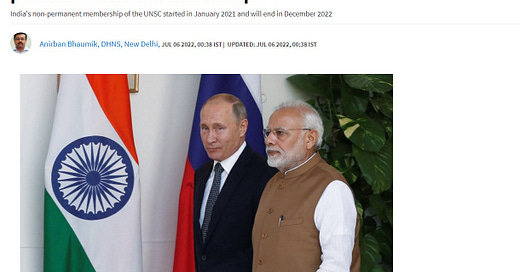The Deccan Herald Misinterpreted Russia’s Stance About Expanding The UNSC
It’s hoped that the Deccan Herald's respected assistant editor Anirban Bhaumik will learn from this politely written rebuttal and thus take care going forward not to unintentionally misportray Russian foreign policy and especially its relations with India.
The Deccan Herald is an Indian newspaper of record and widely respected within this civilization-state, which is why it’s so regrettable that it misinterpreted Russia’s stance about expanding the UNSC. Assistant Editor Anirban Bhaumik published a piece on Tuesday titled “Russia nudges India to break ranks with Germany, Japan in pursuit of UNSC membership”, in which he claimed that Moscow’s refusal to support Germany and Japan’s aspirations for a permanent seat at that global body suggests its intention to “tacitly nudge” India away from those two.
This is the incorrect interpretation that must be respectfully corrected in order to avoid inadvertently misleading the Indian public about this sensitive issue. The Deccan Herald’s misunderstanding originates from Russian Ambassador to China Andrey Denisov’s recent statement on this subject. He expressed support for Brazil and India’s permanent UNSC seat bids but said that Germany and Japan joining would worsen that platform’s existing imbalance between the US-led West and the Global South. This was a sensible assessment that should be taken at face value without implying anything deeper.
Two days later, Russian Ambassador to India Denis Alipov gave an interview to his host’s local Sputnik branch. He declined condemning India’s growing ties with the West on the basis that they actually confirm that Delhi “reject[s] the very idea of dividing lines and the paradigm of bloc confrontation.” Although he didn’t officially say so, it can be implied that he believes that India’s balanced approach to the New Cold War is a model that all other countries should follow. Far from supposedly wanting to pressure it into taking sides like the Deccan Herald claimed, Russia wants India to stay the course.
This clarification is crucial for all observers to keep in mind since part of the US-led West’s information warfare campaign against Russia across the Global South is to falsely claim that it’s pressuring its partners into becoming “anti-Western” and forming some sort of bloc against America. The reality is that it’s actually the US that’s pressuring these countries into becoming anti-Russian and thus unilaterally conceding on an issue of objective national interest. By contrast, Russia respects its partners’ relations with third parties and expects that they won’t interfere with their bilateral ones.
Such is the case with the special and privileged Russian-Indian Strategic Partnership. Both Great Powers know that their ties with third parties like China and the US respectively, not to mention Germany and Japan in the particular example that’s being analyzed, have no negative effect on their bilateral relations. If anything, they actually bolster their partnership by enabling each to keep the other’s rivals in check. For instance, Russia immediately called for peace during the summer 2020 clashes between China and India over the Galwan River Valley while Delhi ensures that the Quad doesn’t focus on Russia.
These outcomes wouldn’t be possible if Russia didn’t enjoy close ties with China and India didn’t enjoy the same with the US. These decades-long strategic partners truly trust one another and would never pressure the other into making a zero-sum choice. This is the fundamental difference between Russia and the US, which the Deccan Herald regrettably hasn’t yet realized. It’s therefore hoped that their respected assistant editor will learn from this politely written rebuttal and thus take care going forward not to unintentionally misportray Russian foreign policy and especially its relations with India.




